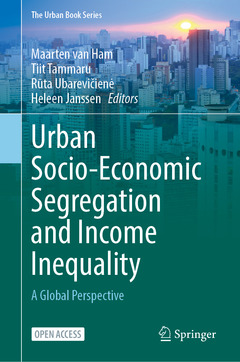Urban Socio-Economic Segregation and Income Inequality, 1st ed. 2021 A Global Perspective The Urban Book Series

This open access book investigates the link between income inequality and socio-economic residential segregation in 24 large urban regions in Africa, Asia, Australia, Europe, North America, and South America. It offers a unique global overview of segregation trends based on case studies by local author teams. The book shows important global trends in segregation, and proposes a Global Segregation Thesis.
Rising inequalities lead to rising levels of socio-economic segregation almost everywhere in the world. Levels of inequality and segregation are higher in cities in lower income countries, but the growth in inequality and segregation is faster in cities in high-income countries. This is causing convergence of segregation trends. Professionalisation of the workforce is leading to changing residential patterns. High-income workers are moving to city centres or to attractive coastal areas and gated communities, while poverty is increasingly suburbanising. As a result, the urban geography of inequality changes faster and is more pronounced than changes in segregation levels. Rising levels of inequality and segregation pose huge challenges for the future social sustainability of cities, as cities are no longer places of opportunities for all.
Open access book providing a comprehensive overview of income inequality and socio-economic segregation in large cities
Offers a systematic comparison of changes in income inequality and socio-economic segregation on a global level
Focuses on occupational and socio-economic segregation
Includes supplementary material: sn.pub/extras
Date de parution : 03-2021
Ouvrage de 523 p.
15.5x23.5 cm



